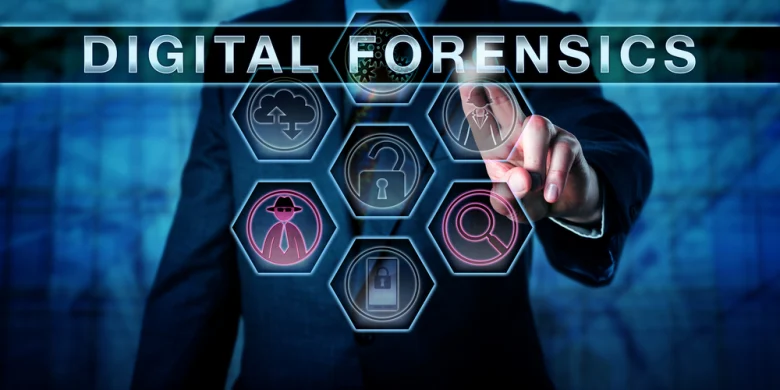As crime becomes increasingly technology-driven and data becomes more important as evidence in the digital world, digital forensics has become a key area for police, lawyers, and cybersecurity experts. While digital forensics is a field that deals with private and sensitive information, it is subject to strict laws. Certain illegal activities can exploit digital evidence.
Digital forensics professionals, businesses, and individuals concerned about privacy and data security need to understand the permissible and prohibited practices. Breaking the law’s rules can lead to the rejection of evidence or, worse, legal repercussions for investigators. This article will explain digital forensics laws and attempt to show the ethical differences between legitimate investigations and illegal access.
How to Understand Digital Forensics and Why It Matters:
Digital forensics is all about finding, storing, analyzing, and displaying digital evidence legally. Computers, phones, servers, cloud files, and even social media sites can provide this evidence. This type of testimony is important because digital data is increasingly being used in various sectors, including criminal law, civil litigation, corporate governance, and cyber incident response.
Digital forensics helps detect cybercrime, data breaches, online harassment, and fraud by following digital trails and collecting evidence that can be used in court. However, its effectiveness depends on whether the intelligence process adheres to the rules set by the government and legal system. A single error during data retrieval or processing can invalidate the entire detector.
Evidence Collection and the Role of Authorization and Consent:
Digital forensics is legal as long as the data subjects consent. Before investigators can access someone’s digital assets, they must obtain permission from the data owner or a court-ordered search. Unauthorized access is usually illegal and a violation of privacy laws. This is true for companies monitoring employees’ laptops as well as police officers checking someone’s cell phone.
In a corporate environment, managers typically obtain prior consent, through company policies and employment agreements, to monitor employees’ devices and conversations. However, this does not guarantee complete compliance. To avoid legal disputes, consent must be clear, detailed, and preferably in writing. Even the strongest evidence can be rejected if the proper consents are not granted.
Chain of Custody and What It Means in Law:
The documentation is called the “chain of custody” and shows how evidence was handled from the moment it was discovered to when it was presented in court. That’s the law, and we must ensure that the evidence is intact and authentic. We can question the evidence if there is a break in its preservation. This process is especially important in digital forensics because digital data is so easy to alter, delete, or copy. Investigators must log everything, including when, where, and how data was collected and analyzed. If evidence is not preserved, it can be dismissed, charges can be dropped, or the investigator can be prosecuted.
Surveillance and Monitoring Have Their Limits:
Surveillance and tracking are legally very sensitive topics in digital forensics. Monitoring tools are useful for catching people doing things they would rather not do, but they are not allowed everywhere. In many countries, it is illegal to record someone’s conversations or track their location without their knowledge, unless a court approves. There are also strict rules about monitoring people’s emails, keyloggers, webcams, and browsers. If employers closely monitor their employees and violate their privacy rights, they risk facing lawsuits. Surveillance activities must always be well-justified, clear, and in compliance with local data protection laws, such as the European GDPR or California’s CCPA.
Managing Digital Evidence Across Countries:
In today’s globalized digital world, it is common for digital evidence to be used in multiple countries. Data stored on servers in Ireland or social media posts in India can be used in criminal cases in the United States. On the other hand, collecting and using digital certificates across borders raises many legal issues. Each country has its privacy laws, rules on data retention periods, and legal requirements for proof of collection. Without appropriate foreign cooperation or an agreement such as a Mutual Legal Assistance Treaty (MLAT), obtaining such information can be illegal. To ensure that evidence has been collected legally and can be used in court, investigators must proceed with extreme caution, often cooperating with foreign agencies or following diplomatic procedures.
Conclusion:
Digital forensics is a powerful way to uncover the truth in the digital age. However, we must apply it with caution and a strong legal sense. The laws that govern how people use technology also change over time. To ensure that investigations are legal and effective, those working in this field must stay up-to-date on changing laws, ethical standards, and local regulations. Today, everyone needs to understand the legal aspects of digital forensics, whether they’re investigators, business owners, or just tech-savvy individuals. Errors in this field not only harm the case but also the entire legal system.
FAQs:
1. What happens if someone obtains the digital certificate without permission?
If you obtain digital evidence without the proper legal permission, you may not be able to use it in court. Additionally, individuals or groups who make illegal purchases may face legal repercussions, such as lawsuits or criminal charges.
2. Do managers have access to their employees’ devices?
The answer depends on where you live and what your employment contract says. Managers typically need to notify their employees about potential monitoring and secure their written consent.
3. If I delete the data, can I still use it in court?
Yes, deleted material can be used as evidence, provided it is properly restored and the chain of custody is intact. However, if the recovery method is not correct, the file may no longer work.
4. Are cell phones immune to the threat of digital forensics?
Yes, hacking into someone’s cell phone is generally illegal and considered a violation of privacy unless the owner’s permission is obtained or there is a court order.
5. Do people who work in digital forensics need a warrant to view a suspect’s computer?
Yes, in most legal systems, you need a search warrant to view and examine a suspect’s digital devices. There are exceptions, but they are very specific and narrowly defined.




